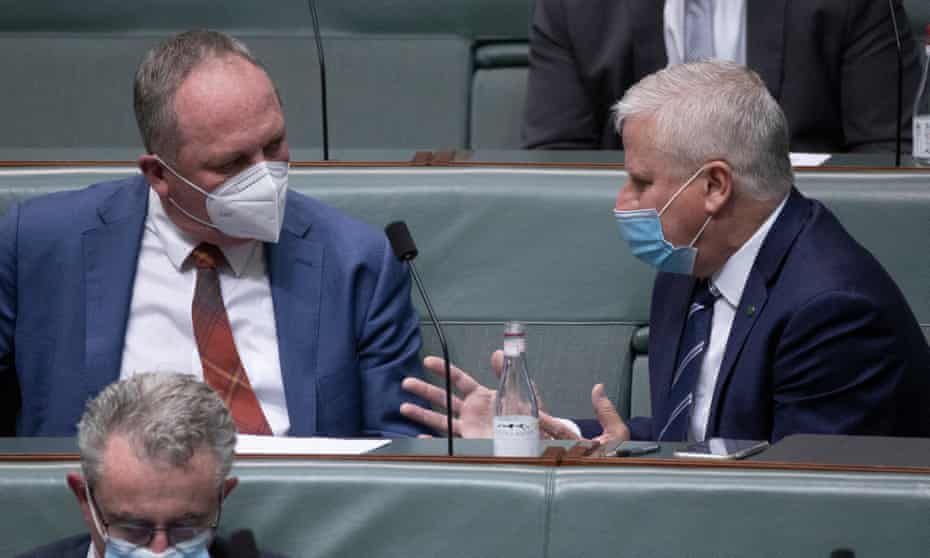Michael McCormack contradicts Barnaby Joyce on Nationals signing Cop26 pact
Ex-Nationals leader McCormack says any government agreement covers party, days after Joyce said ‘I did not sign it’

Former deputy prime minister Michael McCormack has contradicted Barnaby Joyce’s claim the Nationals did not sign off on the final communique of the Glasgow climate summit.
McCormack, the former Nationals leader, said any agreement the Australian government signs also covers the National party, and left open the option of the Morrison government proposing a higher emissions reduction target for 2035.
Joyce earlier this week suggested the Nationals had not been a party to the final Cop26 communique that requests that countries re-examine and strengthen their 2030 targets when they return to the negotiating table next year for Cop27 in Egypt.
“The Nationals did not sign it. I did not sign it,” Joyce told the ABC on Monday.
But McCormack said on Wednesday any agreement the Australian government signed involved the National party, which governs in coalition with the Liberal party.
“I’m not distancing myself from anything in that regard,” the former Nationals leader told the ABC.
“Those questions have to be put to the current leader”.
Asked whether it had been inappropriate for Joyce to distance the Nationals from what was clearly a government decision, McCormack said: “We’re in full agreement with the government and the government’s position is the government’s position we took to Glasgow”.
Ahead of the Glasgow summit, Scott Morrison secured agreement from the Nationals to adopt a new emissions reduction target of net zero by 2050. The prime minister also sought agreement for an increase in the Abbott-era 2030 target, but that sortie was vetoed by Joyce.
The Morrison government supported language in the final Glasgow communique pointing to a review of the 2030 target before the next United Nations-led climate summit in Egypt.
But in a statement issued in Australia shortly after Glasgow wrapped, ministers Marise Payne and Angus Taylor suggested the Coalition had no plans to ratchet up ambition. The statement said Australia’s 2030 target was “fixed”.
Joyce has made it clear this week the Nationals will not support any increase in the 2030 target.
On Tuesday, he said: “The Nationals have clearly stated that they aren’t changing the 2030 target”.
“We’ve been honest and upfront about that … we’ve told you the truth about what our position is.”
A number of Liberals had hoped Morrison would go to the looming election seeking a mandate from voters for a higher 2030 emissions reduction target, but the prime minister has ruled that out.
Some Liberals are now urging Morrison to go to the election with a new emissions reduction target for 2035.
McCormack left that idea open on Wednesday. He said setting a 2035 target would be “a matter for the cabinet going forward”.
“We’re meeting and beating our 2030 targets,” he said. “Let’s see as we get closer to 2030 as to how well we’re doing”.
“Of course, politics is ever evolving and we’re making sure that we do the responsible thing by lowering emissions but at the same time protecting the economy”.
Joyce has also not directly answered questions about whether the Nationals would accept a higher emissions reduction target for 2035. He has given the impression Nationals would oppose an increase, but he has not been definitive.
Asked earlier this week about the renewed 2035 push by Liberals, including Jason Falinski and Dave Sharma, Joyce said they were “great people” who represented an affluent metropolitan constituency.
While avoiding a direct answer on 2035, Joyce contended the view of voters in Sydney was different to the “view you get in Singleton or Muswellbrook”. Joyce said Liberals and Nationals needed to represent their respective constituencies.
